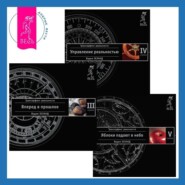По всем вопросам обращайтесь на: info@litportal.ru
(©) 2003-2025.
✖
Reality Transurfing: steps 1-5
Настройки чтения
Размер шрифта
Высота строк
Поля
To experience reciprocal love you must let go of the right to possess.
You always have to pay for expressions of contempt and vanity.
Let go of the need to assert your superiority.
Striving to hide shortcomings creates the opposite effect.
Your positive qualities compensate for any inadequacies.
The greater the importance of your goal, the less likely you are to achieve it.
Desires are realized when they are free of excess potential created by projected importance and dependency.
Let go of feelings of guilt and the need to justify your actions.
To let go of guilt, it is enough to give yourself permission to be yourself.
No-one has the right to judge you. You have the right to be yourself.
Money comes of its own accord as an attribute on the path to your goal.
Greet money with love and attentiveness and part with it without regret.
Having let go of inner and outer importance you acquire freedom of choice.
The projection of importance is the only obstacle on the way to fulfilling your desires.
Do not try to overcome obstacles; reduce the amount of importance you project onto them.
Take care without worrying.
Chapter V. The Induced Transition
Do Not Absorb Negative Information
The Generation Shift
People have always hankered after “the good old days”. With age life somehow seems to get worse. People turn to reminiscing about their youth and times when the colours were richer, first impressions more vivid, dreams attainable, music was better, the climate more favourable, people were more approachable, and meat was more tender, to say nothing of their health. Life was full of hope, pleasure and joy. Once a certain number of years have passed, people begin to sense that events do not make them as happy as they did before. Picnics, parties, concerts, films, celebrations, dates, warm sea water…from an objective point of view all these things are still pretty much the same quality as they were before. Parties are still fun, films are still interesting and sea water still feels warm. Nonetheless, life is not the same as it used to be. The colours have faded, our responses have dulled and enthusiasm has waned.
Why is it that everything is so much more wonderful when we are younger? Can it really be that our perception of things loses its sharpness as we grow older? We do not lose the ability to laugh, cry, perceive taste and colour, distinguish truth from deceit or differentiate between good and bad just because we are a little older. So, could the world gradually be going downhill? No, the world is not deteriorating. Things only seem to getting worse to certain people. What actually happens is that a person shifts to a negative life line that runs in parallel with former life lines where everything is just as fine now as it was before the individual left them behind. By expressing dissatisfaction a person attunes themselves to life lines that draw them in and where things genuinely are ‘worse’ than before.
According to the principle of Transurfing, the alternatives space has everything for everybody. In one sector, the colours of life have become grey, while in another life remains as bright and cheery as it always was. A person who emanates negative thought energy ends up drawn into a sector with a different type of scenery but the world remains the same for everyone else. This is true not only in extreme cases in which someone has become an invalid, lost their home, their loved ones or become an alcoholic and ruined their life. In most cases, during the course of their life a person regularly slides onto life lines where the colours of the scenery are duller than they were on the previous life line. When this happens a person begins to reminisce about how vivid and fresh everything was years ago.
When a child is born they accept the world the way it is. A child is unaware of the fact that life could change becoming better or worse. Young people have not yet been spoiled and so they are less picky. They are still busy with the task of discovering the world for themselves and enjoying life because they have more hope than cause for complaint. They think that life is pretty much ok and expect it to get even better. With time they experience misfortune and failure and begin to understand that not all dreams come true; that some people are better off and that they have to fight for their place in the sun. As time goes by, they can end up with more cause for complaint than hope. Discontentment and whining become a moving force that pushes a person onto unsuccessful life lines. Expressed in Transurfing terms, this type of person radiates negative energy, which transfers them onto life lines that correspond to the negative parameters of their own thought energy.
Life is less satisfactory the worse you think it to be. Children rarely contemplate whether their childhood is good or not. As children we take everything for granted. We have only just begun discovering the world and have not yet acquired the habit of criticism. The greatest insult we experience as children is not being bought a much wanted toy by a relative. It is only as we get a little older that we start to resent the world around us for fulfilling us less and less. The more we complain the worse things are as a result. Everyone who has survived their youth and reached a mature age will say that a lot of things were better when they were younger.
That is the paradox: you come up against circumstances that disappoint you and so you express your dissatisfaction which then aggravates the situation even more. Your discontent comes back to you like a triple force boomerang. Firstly, the excess potential created by your discontent turns balanced forces against you. Secondly, your discontent serves as a channel through which a pendulum being can draw on your energy. Thirdly, radiating negative energy, you shift onto life lines of a corresponding vibration.
The habit of reacting negatively is so deep-seated that human beings are beginning to lose their advantage over other creatures further down the food chain in their capacity for awareness. An oyster also reacts negatively to external irritants, but unlike the oyster, a human being is able to consciously and intentionally regulate their relationship with the external world. Nevertheless, most people do not use the benefit of awareness, instead responding aggressively to the slightest inconvenience. Aggression is mistakenly interpreted as strength but in fact a person who chooses to express themselves aggressively might as well, metaphorically speaking, be quivering helplessly in a pendulum’s web.
You might think that life is not as good as it used to be but the younger generation happens to think that life is wonderful. Maybe they just do not know how great things were, when you were their age. Having said that, when you were young, the older generation complained about life too and reminisced about the good old days. This pattern cannot simply be explained by the tendency of the human psyche to erase all negative memories leaving just the positive ones. The criticism is aimed at the present moment which is supposedly worse than it used to be.
If you accept the fact that life is getting worse with every passing year then you would have to agree that the world should have simply fallen to pieces a long time ago. An uncountable number of generations have passed since the beginning of human history and each one believes that life’s colours have faded. Many an old man will tell you with absolute certainty how much better Coca-Cola used to be. Coca-Cola was invented in 1886. Imagine how disgusting coke must be by now if it has been consistently worsening in quality since then! Or perhaps one’s sense of taste weakens with age, although that is hardly the case. Anyway, the old man will probably tell you how everything else is of a poorer quality today too, be it furniture, clothes or any other item.
If the world were the same for everyone, after several dozen generations life would have become a nightmare for everybody. So how should we understand the paradoxical statement that the world is not the same for everyone? We all live in the same world comprised of the material realization of alternative life lines and yet every individual experiences a different possible alternative. On the surface of things there are obvious differences in people’s fate. Some are rich, some are poor; some are successful and some are struggling; some are lucky and some unlucky. We all have our own personal reality within the common world we live in. It seems quite straightforward, just as there are rich and poor neighbourhoods in a single town.
The script, role and the scenery differ in different manifestations of reality. The difference in scenery is harder to track. One person looks at the world from the window of their luxurious car whilst another peeks at it from inside a rubbish container. One person enjoys the party whilst another is consumed in thought about their problems. One sees a group of happy youths, another at a gang of hooligans. They are all looking at the same things but the images they perceive differ as black and white film differs from colour. Every individual is attuned to their own sector in the alternatives space and so everyone lives in their own personal world. All these worlds exist in layers that exist one on top of the other forming what we understand to be the space we live in.
It might be difficult to imagine but no one layer can be separated from another. Every individual creates their own reality and that reality intersects and interacts with the rest of the world around us.
Imagine what the Earth was like before any single living creature existed. Winds blow, rains fall, volcanoes erupt and rivers flow. Then suddenly a person is born who begins to observe their environment. The energy of that person’s thoughts stimulates the material manifestation of a certain sector of the alternatives space which represents their specific life in this specific world. That person’s life represents a new layer in the world. Then another person is born who generates another layer. One person dies and a layer disappears, or perhaps is transformed depending on what happens beyond the threshold of death.
We are vaguely aware that other forms of life exist in parallel worlds of some kind. Let us suppose for a moment that there are no living creatures in these worlds whatsoever, at least not yet. What kind of energy would stimulate the material manifestation of space that contained no single living creature? We can only guess. Perhaps, once the last living creature dies, the world itself will disappear? Who can prove that the world exists if there is nobody in it? For if there are no people who would be around to say that the world (in our understanding) exists at all. There would be no world to speak of.
That is enough speculation for now. We do not want to get bogged down in abstract conjecture. Remember though, that Transurfing is just one of many models. All existing theories about the world and life in it are nothing but models. Remember also the notion of importance and try to avoid projecting any outer importance onto the Transurfing model of the universe; otherwise you could become an apologist for futile ideas and try proving to everyone the truth of your own subjective worldview. Truth is an abstract notion for we can only understand some of the world’s forms and laws. Our goal here lies exclusively in attaining maximum practical benefit from our preferred model of the universe.
Now let us return to the topic of the generations. Throughout their lifetime a person re-attunes their energy from the vibration of one sector in the alternatives space to another, thereby transforming the layer of their personal world. The more a person readily expresses their discontent emanating large quantities of negative energy, the more strongly the tendency for the quality of their life to deteriorate is consolidated. A man could acquire great material wealth with age but not necessarily be any the happier for it. The colours of his scenery could just as well fade and life become less enjoyable. The older and the younger generation both drink the same Coca-Cola, swim in the same oceans, ski on the same mountain slopes and everything is pretty much the same as it was many years ago. However, the older man is convinced that in his day everything was better and the young person is convinced that things are better now and when the young person grows old the story will no doubt repeat itself.
There are deviations from this tendency, both for the better and for the worse. Sometimes a person only begins to develop a taste for life as they get older, and the opposite can happen; a successful young man can go downhill until he hits rock bottom. That said, in general, the generations agree that life gets worse as you get older. This is how the shift in generational layers takes place. The layer of the older generation shifts to a life line of poorer quality and the layer of the younger generation gradually follows on behind. The shift takes place gradually, each time starting from a point of optimism. This is precisely why the world as a whole never actually transforms into a living hell. Everyone has their own layer, which they choose themselves. By now you will have a clear picture of how the choice can be made to one’s personal detriment.
In previous chapters we have already talked about how to avoid creating a living hell in your own life layer. You may also wonder whether it is possible for a person to retrieve an earlier section of their world, or return to a life line that was filled with colour and hope like it was in childhood. The Transurfing technique can help with this task but before we look at that it is first useful to understand how exactly a person can end up shifting from a life line full of success and hope to a life line where they would face the question: “So how exactly did your life end up like this?”
The Pendulum Vortex
The human psyche works in such a way that it reacts most strongly to negative irritants such as unwanted information, hostility, danger or any other form of negative energy. Of course, positive influences can also stir strong emotions but the intensity and force of emotions like fear and rage by far outweigh those of joy and happiness. The reason for this originates in ancient times when fear and rage were crucial to survival. What use is joy in a context like that? Joy is not as useful when it comes to defending yourself, avoiding danger and foraging for food. In addition, throughout the entire history of humanity life has been filled with burden and hardship that have brought more grief and fear than joy and happiness. This is generally speaking why man yields readily to thoughts of gloom and depression, while feelings of joy and happiness pass relatively quickly. Have you ever heard of a normal person suffering from too much joy? People who suffer from stress and depression however can be found in good number wherever you look.
Pendulums, in particular, the mass media, actively make use of these particular features of human perception. You rarely hear anything good in the news. Usually, in a news program you hear a negative fact followed up with news coverage. New details gradually emerge, and the details of the story are thoroughly savoured and dramatized.
Other negative news stories covering catastrophes, natural disasters, terrorist acts and armed conflicts are presented according to the same principle. Notice the pattern. Events develop in a spiral of intensity. First there is the catchy headline and then the story is unravelled exposing further details. The tension gradually peaks with emotions running equally high. Finally, the story comes to its conclusion and all of that emotional energy is released into space as a temporary calm descends upon the viewers. Endless TV series are based on the same pattern of build up and release like waves breaking on the shore. From an objective point of view, there is nothing special about these programmes. All the “drama” is literally created out of thin air. However, you only have to watch two or three episodes and you are hooked. Why is this, after all, nothing particularly interesting ever happens? You become hooked because the frequency of your thought energy is caught by the pendulum of the TV series, and your attention becomes fixed on that sector within the alternatives space.
This is the mechanism that winds the spiral mentioned above: At first a person is confronted with a fact which theoretically they may or may not find upsetting. Let us suppose that the fact is a fresh piece of news about a negative event that has taken place somewhere in another country. This represents the destructive pendulum’s first prod. If a person is touched by the news story they respond to the stimulus by expressing their thoughts and feelings about it. If the news concerns them they will begin radiating energy at the same frequency as the pendulum’s initial prod. Like thousands of others the person responds to the pendulum with interest thereby participating in the overall event. The vibration of the person’s thought energy begins to resonate with the pendulum increasing the force of its energy. Meanwhile, the media continues its campaign. The person follows developments with interest making sure that the pendulum receives its nourishment. This is a typical example of how a pendulum entices adherents into its web so that it can continually suck energy from them. The person who becomes increasingly interested in the news piece absorbs some of its negative energy and whether they are aware of it or not they are now involved in a game, at least as an observer. At first glance, it does not look as if anything untoward has happened. Watching the news is a matter of course. So what if a person gives a bit of their energy to a destructive pendulum? It is not as if it will affect their health. When a person begins radiating energy at the frequency of a negative event, they shift onto a life line that is located closer to other life lines in which such events take place. They begin to play a part in the plot. They find themselves within the impact area of a spiral that rotates faster and faster, drawing them into a vortex, like water into the funnel of a whirlpool. The interaction between the individual and the pendulum becomes increasingly close, and the person accepts the event as an unavoidable part of their life. Their attention becomes selective and it will seem as if new facts about similar events in different countries are popping up everywhere. The person will discuss the news with their close friends and relatives who will no doubt respond with interest and compassion. The energy of the pendulum grows as a result and the individual is drawn ever closer, by the frequency of their thought energy to the life line of the original event except at this stage they are no longer an observer, but a direct participant.
The phenomenon of being drawn further towards the vortex can be described as an induced transition to a life line where the adherent becomes the victim of a destructive pendulum. The individual’s response to the pendulum’s initial prod and the mutual exchange of energy that follows induces a shift to a life line with a vibration very similar to that of the pendulum’s sway. As a result, a negative event occurs in the layer of this person’s life.
Disaster
Most people accept that theoretically they could end up being involved in a catastrophic event but not all actually allow the possibility into the layer of their personal world. There are people who do not watch TV serials, have no interest in the news, and are emotionally undisturbed by events taking place somewhere else in the world. They live in a different life layer to these events and are adherents of other pendulums. They remain undisturbed by the fact that somewhere in the world there has been a plane crash. They listen to the news indifferently whilst they eat their supper probably because they have enough to deal with in their own lives.
The type of person most likely to undergo an induced shift shows active interest in disasters that involve other people and take place in other areas. This kind of person is deeply disturbed by news of such events. Sometimes, when a person suffers few problems of their own there is a tendency to fill the empty space in their lives by giving their attention to events taking place in life layers other than their own. This type of person regularly reads the tabloids, watches TV series, or awaits news updates on tragic accidents and natural disasters. Tabloids and soap operas are the activities of small, harmless pendulums. Adherence to pendulums in this category does nothing more than make up for a deficit of information, emotion and experience in a person’s own life. In contrast, displaying an active interest in catastrophes and natural disasters poses a real threat, for these are the manifestation of stronger, more aggressive pendulums.
The vibration of thought energy radiating from a person who gives their attention to tragic events is hooked in the same way as it is by a television series. Anyone who looks for negative information will always find an abundance of it. At first they play the innocent role of observer like a person watching a football match from the grandstand. The game gradually becomes more gripping and the observer becomes a fan. Then they walk onto the playing field and start to run about waiting for the ball. Gradually, unnoticeably, the fan becomes more involved in the game and in the end another player will pass them the ball. Metaphorically speaking, the original observer has become a player, a victim of disaster.
Could it really be otherwise? A person allows information related to disaster to become a part of their life. They unwittingly accept the fate of victim and eventually, materialize misfortune in an alternative life line. Of course, the person had no intention of becoming a victim but that is unfortunately of no consequence because once a person has agreed to join the role they will play is chosen by the pendulum. Whereas for many people personal involvement in a disaster would signify the result of a fatal train of events, for our victim, it would represent the logical end to a line of behaviour that increased the probability of their being in the wrong place at the wrong time.
If you ignore the prod of a destructive pendulum you will never end up involved in a catastrophic event or at least the probability of it happening will be close to zero. You may object that thousands of people have lost their lives in tragic accidents and natural disasters; surely not all these people were thinking about catastrophes simultaneously? The thing is that we do not live alone in the world. We are surrounded by other people who are actively working for destructive pendulums and radiating energy within the pendulum’s spectrum. It is not possible to become totally and ideally isolated from these vibrational frequencies. The common field encompasses you, and without being consciously aware of it, you begin to radiate energy at the same frequencies as the surrounding field. The roots of this type of behaviour go back to very ancient times when the herd instinct helped to protect the group from danger. This is why the energy field of an induced shift grows, producing a snowball effect that pulls you in like water to the centre of a whirlpool.
The task is to stay as far away as possible from the pendulum’s vortex. This means not absorbing negative information relating to catastrophic events and disasters; showing no interest; refraining from worry or discussion and generally, letting the information pass you by. Notice that we say ‘let the information pass you by’, rather than try to avoid it. As we know from previous chapters, trying to avoid a meeting with a pendulum is the same as seeking out a meeting with it. When you resist something, desire specifically to avoid something or express your enmity towards something you actively radiate energy at the frequency of the object you are trying to avoid. To ‘let something pass you by’ means not to absorb or react to negative information; simply ignore it and switch your attention to harmless television programs and books.

















